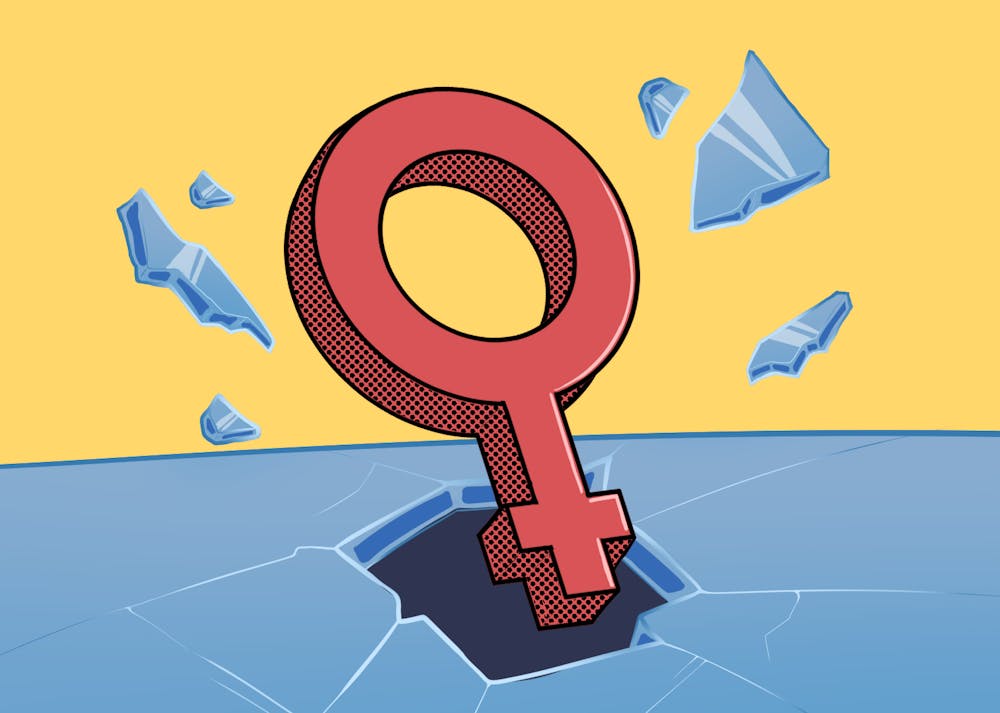There is a growing popularity of shock-value misogyny among young people, which is becoming disturbingly visible in our day-to-day lives.
Social media personalities who utilize the popularity of shock-value misogyny are often written off as attention-seeking, but the casual and performative misogyny is still incredibly harmful to women and gender relations. The implications of these behaviors should not just be dismissed.
Over the past year, infamous internet sensation Andrew Tate has garnered attention on social media for holding outrageously misogynistic views, including beliefs that women are men’s property, assaulting women for cheating is OK, and how men should date women who are 18 or 19 rather than women in their mid-20's because they can "make an imprint" on them.
Instead of Tate inhabiting an obscure corner of the internet, he was instead one of the most famous figures on TikTok, where he accumulated 11.6 billion views, before being banned from the app in August. While Tate’s views may seem ridiculous, his impressionable audience of young men is seemingly priding themselves on holding the same misogynistic beliefs.
On Oct. 27, ASU experienced the phenomenon of performative misogyny firsthand when a man stood outside the Memorial Union wearing a shirt that said: "Women Are Property." His behavior attracted large crowds and even police presence, however, he was not removed from campus.
Once again, we see men displaying attention-seeking behavior in the form of outrageous misogyny.
University and regents professor of women's and gender studies and founding director of the Humanities Lab at ASU Sally Kitch attempted to answer the question as to why this behavior is becoming so common.
"It seems like a cry of desperation, really," Kitch said. "I think it has to do with imagined threats to masculinity and imagined scenarios where women are going to take over and men won’t feel like men."
The patriarchy and misogyny are not just harmful to women but have damaging effects on men as well, Kitch said. The oppressive structure of misogyny does not allow men to know "where the rewards of being a man come from," leading them to be susceptible to negative views of women.
Kitch understands that the misogynistic behavior on social media is rooted in attention-seeking, but notes that it is still incredibly harmful. The most concerning issue is the physical manifestations of these misogynistic beliefs.
The Violence Policy Center reports that 2,059 women were killed by men in America in 2020. Of these women, 89% of their perpetrators were men that they knew. The U.S. is ranked 34th globally for intentional female homicides with a rate of 2.6 killings for every 100,000 women. This gender-based killing is now even referred to as "femicide."
"In a society where violence is so prevalent and where weapons are so easily available, it’s dangerous," Kitch said.
Although misogynistic views like those held by Tate may seem too outrageous to be real, the irony is lost when rates of violence against women are so disturbingly high.
Junior philosophy student Kamden Korn depicted growing up with unrestricted access to the internet and how prominent misogyny is in the media that men consume.
"For many men, there really is no other alternative (to social media). Nobody else is telling them how to be confident and sure of themselves. Unfortunately, this advice is wrapped up into a world of traditionalist stereotypes of submissive women and generally right-wing viewpoints," Korn said.
Korn claims that in order to avoid the pitfalls of social media, one has to be able to interact positively with women in their lives and push themselves to have women friends who can teach them how to maintain healthy relationships with the opposite sex.
"I have always been friends with women platonically, (and) I think this balance showed me the sort of do's and don'ts of how to interact with women and not to be a (misogynist)," he said. "It's really about understanding others for who they are."
Similarly, Kitch touched on the understanding of gender that men seem to currently be missing, and how those who seek out this understanding are probably not the ones who need it the most.
"I would like to see courses in gender and gender relations and race and racial relations required of all of our students so that these issues could be out on the table in a thoughtful way, not just (through) slogans and things that get bandied about," she said.
Extending Kitch's view to youth education is imperative to combating this misogyny before it becomes a problem. In order to teach young men healthy perceptions of the sexes, schools and universities such as ASU should focus on fostering productive conversations on gender through required gender relations classes and discussions in diversity courses.
It is easy to brush off internet personalities like Andrew Tate or immature young men like the one toting a misogynistic shirt on ASU’s Tempe campus, but their outlandish behavior has real-world consequences like femicide and perpetuating persisting cycles of misogyny. Whether through conversations with women friends or seeking out gender relations classes, men should think critically about the media they interact with and actively work to not perpetuate these cycles of misogyny.
Edited by Sadie Buggle, Wyatt Myskow, Sophia Balasubramanian and Grace Copperthite.
Reach the columnist at haleighbell1026@gmail.com and follow @wwoodengirl on Twitter.
Editor's note: The opinions presented in this column are the author's and do not imply any endorsement from The State Press or its editors.
Want to join the conversation? Send an email to opiniondesk.statepress@gmail.com. Keep letters under 500 words and be sure to include your university affiliation. Anonymity will not be granted.
Like The State Press on Facebook and follow @statepress on Twitter.




